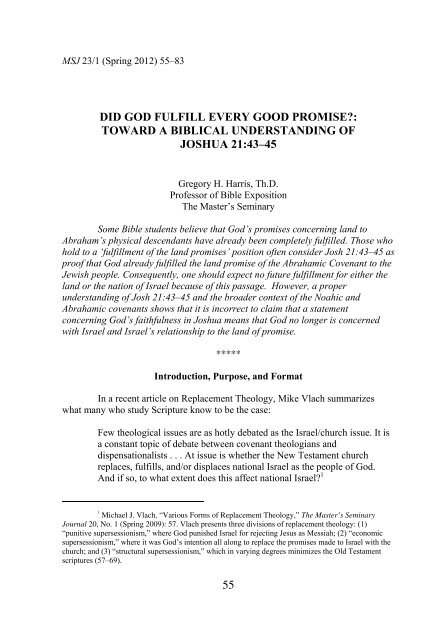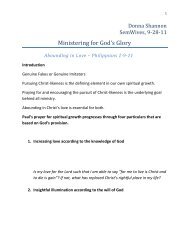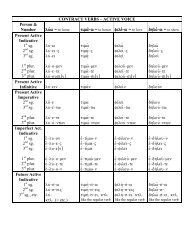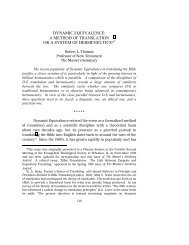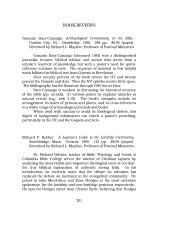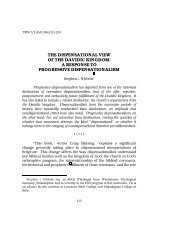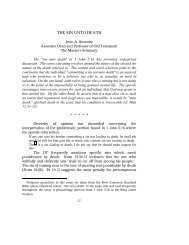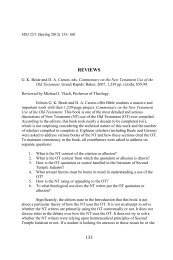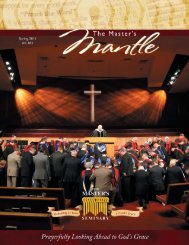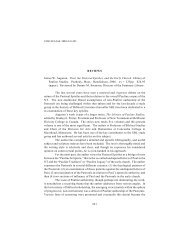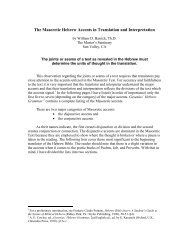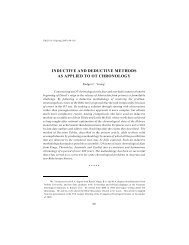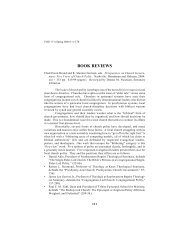Did God Fulfill Every Good Promise? - The Master's Seminary
Did God Fulfill Every Good Promise? - The Master's Seminary
Did God Fulfill Every Good Promise? - The Master's Seminary
Create successful ePaper yourself
Turn your PDF publications into a flip-book with our unique Google optimized e-Paper software.
MSJ 23/1 (Spring 2012) 55–83DID GOD FULFILL EVERY GOOD PROMISE?:TOWARD A BIBLICAL UNDERSTANDING OFJOSHUA 21:43–45Gregory H. Harris, Th.D.Professor of Bible Exposition<strong>The</strong> Master’s <strong>Seminary</strong>Some Bible students believe that <strong>God</strong>’s promises concerning land toAbraham’s physical descendants have already been completely fulfilled. Those whohold to a ‘fulfillment of the land promises’ position often consider Josh 21:43–45 asproof that <strong>God</strong> already fulfilled the land promise of the Abrahamic Covenant to theJewish people. Consequently, one should expect no future fulfillment for either theland or the nation of Israel because of this passage. However, a properunderstanding of Josh 21:43–45 and the broader context of the Noahic andAbrahamic covenants shows that it is incorrect to claim that a statementconcerning <strong>God</strong>’s faithfulness in Joshua means that <strong>God</strong> no longer is concernedwith Israel and Israel’s relationship to the land of promise.*****Introduction, Purpose, and FormatIn a recent article on Replacement <strong>The</strong>ology, Mike Vlach summarizeswhat many who study Scripture know to be the case:Few theological issues are as hotly debated as the Israel/church issue. It isa constant topic of debate between covenant theologians anddispensationalists . . . At issue is whether the New Testament churchreplaces, fulfills, and/or displaces national Israel as the people of <strong>God</strong>.And if so, to what extent does this affect national Israel? 11Michael J. Vlach, “Various Forms of Replacement <strong>The</strong>ology,” <strong>The</strong> Master’s <strong>Seminary</strong>Journal 20, No. 1 (Spring 2009): 57. Vlach presents three divisions of replacement theology: (1)“punitive supersessionism,” where <strong>God</strong> punished Israel for rejecting Jesus as Messiah; (2) “economicsupersessionism,” where it was <strong>God</strong>’s intention all along to replace the promises made to Israel with thechurch; and (3) “structural supersessionism,” which in varying degrees minimizes the Old Testamentscriptures (57–69).55
<strong>Did</strong> <strong>God</strong> <strong>Fulfill</strong> <strong>Every</strong> <strong>Good</strong> <strong>Promise</strong>? | 57Many readers of the Bible who hold the fulfillment of the land promisesposition consider Josh 21:43–45 to be their proof text clearly showing that <strong>God</strong> hasalready fulfilled the land promises given the Jewish people in the AbrahamicCovenant, and consequently one should expect no future fulfillment for either theland or the nation of Israel:So the LORD gave Israel all the land which He had sworn to give totheir fathers, and they possessed it and lived in it. And the LORDgave them rest on every side, according to all that He had sworn totheir fathers, and no one of all their enemies stood before them; theLORD gave all their enemies into their hand. Not one of the goodpromises which the LORD had made to the house of Israel failed; allcame to pass. 5While at first glance these verses do indeed seem to give credence to sucha conclusion that <strong>God</strong> has already fulfilled all the land promises to Israel, such aninterpretation seems to be surprisingly relatively new and growing in popularity,often appearing in Internet chatrooms 6 or blogs and in some rather recentlypublished books. 7While by no means limited to them, one of the most vocal groups claimingthat <strong>God</strong> fulfilled the Abrahamic Covenant land promises is New Covenant<strong>The</strong>ology which “is a relatively new system which, though not yet well defined,attempts to combine strengths of Dispensationalism and Covenant <strong>The</strong>ology and toeliminate the weak points between the two.” 8 With their understanding that the landpromises have been fulfilled by the time of Joshua, it would not be surprising that5 All Scripture references used are from the NASB 1971 edition unless otherwise stipulated.6 An example of a posted website referring Joshua and the land promises is Michael D.Marlowe, editor, <strong>The</strong> Bible Researcher web site. <strong>The</strong> first part of affirmation #9 of their doctrinalstatements says this: “<strong>The</strong> entitlement of any one ethnic or religious group to territory in the Middle Eastcalled the ‘Holy Land’ cannot be supported by Scripture. In fact, the land promises specific to Israel inthe Old Testament were fulfilled under Joshua” http://www.bible–researcher.com/openletter.html(accessed 11/15/2011). A list of signatories for this open letter is at the bottom of the page.7 While this will be developed throughout this article and reasons given why it has not been acommon interpretation, just a sampling of those of amillennial and/or covenantal persuasion who do nothold this teaching from Josh 21:43–45 are John Calvin, Commentaries on the Book of Joshua, trans.Henry Beveridge, Biblical Commentary on the Old Testament (reprint; Grand Rapids: Baker, 1999),247–48; Keil of Carl Friedrich Keil and F. Delitzsch, Joshua, Judges, Ruth, 1 and 2 Samuel,Commentary on the Old Testament. 10 vols. (reprint; Peabody, Mass: Hendrickson Publishers, 2001),2:156–57; Martin H. Woudstra, <strong>The</strong> Book of Joshua, NICOT (Grand Rapids: Eerdmans, 1981), 314–15;Dale Ralph Davis, No Falling Words: Expositions of the Book of Joshua (Grand Rapids: Baker, 1988)157–58; J. Alberto Soggin, Joshua: A Commentary (Philadelphia: Westminster Press, 1972), 201–06;Robert G. Boling, Joshua, <strong>The</strong> Anchor Bible (Garden City, NY: Doubleday, 1982), 498–500; and C. J.Goslinga, Joshua, Judges, Ruth, Bible Student’s Commentary (Grand Rapids: Zondervan, 1986), 152–53.8 Dennis M. Swanson, “Introduction to New Covenant <strong>The</strong>ology,” <strong>The</strong> Master’s <strong>Seminary</strong>Journal 18, No. 1 (Fall 2007): 149. That entire journal evaluates various claims and doctrines of NewCovenant <strong>The</strong>ology. Of particular relevance to this article is William D. Barrick, “New Covenant<strong>The</strong>ology and the Old Testament Covenants,” <strong>The</strong> Master’s <strong>Seminary</strong> Journal 19, No. 1 (Fall 2007):165–80.
58 | <strong>The</strong> Master’s <strong>Seminary</strong> JournalJosh 21:43–45 would play a vital role in their taking this position. 9 Thus it isconcluded by New Covenant theologians that Josh 21:43–45 is their irrefutable“trump card” concerning <strong>God</strong>’s total fulfillment of Abrahamic Covenantobligations, at least as far the land is concerned. Lehrer writes as a representative ofNew Covenant <strong>The</strong>ology:<strong>The</strong> book of Joshua tells us that when the Israelites had finally takenmost of the land, all of the promises given to Abraham had beenfulfilled (Joshua 21:43–45). Nothing else needed to happen for <strong>God</strong> tomake good on His word to Abraham. His promises of rest andpossession of the land had been fulfilled, just like his promises ofmany descendants and a special relationship with <strong>God</strong>. It was allfulfilled by the time of the conquest of the Land of Canaan underJoshua. 10Adams argues along the same lines: “So the LORD gave Israel all the land he hadsworn to give their forefathers, and they took possession of it and settled there . . .Not one of the LORD’s good promises to the house of Israel failed; every one wasfulfilled. Joshua 21:43–45, emphasis added.” 11However, it should be noted that seeing a fulfillment of the land promisesis by no means limited to New Covenant <strong>The</strong>ology. Cox presents the sameconclusion written decades earlier:<strong>Did</strong> <strong>God</strong> keep the promise to Joshua? <strong>The</strong> futurist cannot allow it . . .We could summarize these promises concerning the land of Canaanbeing inherited by Israel as follows: <strong>The</strong> land was promised throughAbraham; the promise was renewed to Isaac, Jacob and Moses. Itwas fulfilled literally through Joshua . . . How sad it is then that sometheologians are still arguing that they are yet future! Much of thefuturist belief rests on the assumption that <strong>God</strong> has never given Israelall the land promised through Abraham. 12Mathison summarizes the fulfillment view and sites the importance Josh 21:43–45plays in proving this: “<strong>The</strong>re are numerous other passages in the Old Testament that9 See Thomas, “Dispensationalism’s Role in the Public Square,” 26–29, and Barrick’s “NewCovenant <strong>The</strong>ology and the Old Testament Covenants,” 171–75 for a critique of how New Covenant<strong>The</strong>ology proponents understand the promises of the Abrahamic Covenant having been fulfilled.10 Steven Lehrer, New Covenant <strong>The</strong>ology: Questions Answered (n.p. 2006), 32. Lehrer’sreasoning “when the Israelites had finally taken most of the land, all of the promises given to Abrahamhad been fulfilled” (emphasis mine) is contradictory in and of itself, but this will be developed in moredetail elsewhere in this article.11 Michael W. Adams, “In Defense of the New Covenant: A <strong>The</strong>ology Response to RichardBarcellos’ Book, In Defense of the Decalogue: A Critique of New Covenant <strong>The</strong>ology,”http://www.ncbfnet/PDF/Defense/pdf, 8, (accessed 01/10/10). [emphasis in the original]19–20.12 William Cox, <strong>The</strong> New Covenant Israel (Philadelphia: Presbyterian and Reformed, 1963),
<strong>Did</strong> <strong>God</strong> <strong>Fulfill</strong> <strong>Every</strong> <strong>Good</strong> <strong>Promise</strong>? | 59tell us that <strong>God</strong> has already fulfilled the land promises given to Israel (Josh 11:23;21:21–45; Neh 9:25). Joshua 21:43–45 explicitly declares that all the land promisedIsrael was given to them.” 13 DeMar shows how interpreting Josh 21:43–45 as beingalready fulfilled affects the interpretation of other important prophetic passages. Aspart of the support that there is no time gap between Daniel’s sixty-ninth andseventieth weeks, DeMar presents his second point of argumentation as a knownand an indisputable fact: “In addition, the text [Dan. 9:26] says nothing about therestoration of Israel to her land as a fulfillment of some covenant obligation. All theland promises that <strong>God</strong> made to Israel were fulfilled (Joshua 21:43–45).” 14Obviously the importance of this is noteworthy: if Josh 21:43–45 can be shown tohave already been fulfilled, then the point supporting the fulfillment of Daniel 9 isvalid; however, if it can be shown that these promises have not been fulfilled, thenhis second point of his support for interpreting Dan 9:26 has no basis in one’seschatological interpretation elsewhere.<strong>The</strong> purpose of this article is to examine the validity of the claims that Josh21:43–45 inarguably proves that all the land promises given by <strong>God</strong> to Israel havealready been fulfilled and consequently have no future eschatological significance.This will be done by (1) a brief overview of the covenants of <strong>God</strong> up to Joshua 21,(2) an examination of the original geographic boundaries of the AbrahamicCovenant, with special note of the importance of the Euphrates River, (3) a surveyof the eschatological significance of Lev 26:40–45, (4) examining strategicpassages from the Book of Joshua, (5) critiquing a popular proponent who arguesfor the complete fulfillment of the Josh 21:43–45, and finally (6), a proposedinterpretation.An Overview of the Covenants of <strong>God</strong> Pertaining to Joshua 21Although Joshua 21 is often the beginning place of the study for manywho cite these verses as proof that <strong>God</strong> has already fulfilled the land promises ofthe Abrahamic Covenant, this is not an appropriate place to begin; there are manyother crucial matters to consider. For instance, the Abrahamic Covenant, to whichthey refer, is the second covenant recorded in Scripture. <strong>The</strong> first covenant inScripture, the Noahic Covenant, is important since although often not the case in aconsistent manner, the hermeneutic in how one approaches a covenant of <strong>God</strong>should be noted. 15 Before summarizing the six covenants of <strong>God</strong> found in the Bible(the Noahic, the Abrahamic, the Priestly, the Mosaic, the Davidic, and the NewCovenant), Busenitz rightly reasons: “Let no one underestimate the importance andsignificance of a correct understanding of the divine covenants. It is much morethan an intellectual pursuit. <strong>The</strong>y provide a most foundational theological anchor13 Keith A. Mathison, Dispensationalism: Rightly Dividing the People of <strong>God</strong>? (Phillipsburg,NJ: Presbyterian and Reformed, 1995), 27. [emphasis in the original]14 Gary DeMar, Last Days Madness (Atlanta: American Vision, 1999), 332.15For an excellent article depicting the component parts of the covenants of <strong>God</strong>, see Irvin A.Busenitz, “Introduction to the Biblical Covenant; the Noahic and the Priestly Covenant,” <strong>The</strong> Master’s<strong>Seminary</strong> Journal 10, No. 2 (Fall 1999): 173–89.
60 | <strong>The</strong> Master’s <strong>Seminary</strong> Journalfor understanding <strong>God</strong>’s working in human history.” 16 Further, “Understandingthese six covenants will shape a person’s understanding of Scripture. It will reflecta hermeneutical course which will determine the pitch of one’s eschatologicalsails.” 17 This is important: while most people do not realize it, how one interpretsthe covenants of <strong>God</strong> will ultimately and immensely factor into one’s eschatology;there is no way to avoid this.<strong>The</strong> Noahic CovenantWhile we are not able to go into detail of the covenants of <strong>God</strong> within thisarticle, it is necessary to at least examine the component parts of the covenantsunder which Joshua would be familiar since they affect the interpretation of Josh21:41–43. 18 <strong>God</strong>’s promises in the Noahic Covenant are plainly seen in Scripture.In fact, it is within the framework of the Noahic Covenant in Gen 6:18 that theword “covenant” first occurs in Scripture where, before sending the flood, <strong>God</strong>promises, “I will establish My covenant with you . . .” 19 It is significant that <strong>God</strong>refers to it as His covenant because He alone makes it; it is a unilateral, not abilateral, covenant. From the text one would expect (1) that the enduring seasonsare an aspect of this covenant (Gen 8:22); (2) <strong>God</strong>’s own emphatic self–identification that “Now behold, I Myself do establish My covenant with you” (Gen9:9); (3) His solemn promise that never again will all flesh be destroyed by meansof the flood (9:11); (4) the rainbow will be the sign for the covenant as long as thecovenant is valid (9:12–17), and (5) significantly, the covenant is presented as an“everlasting covenant” between <strong>God</strong> and all flesh that is on the earth (9:16). 20 <strong>The</strong>Noahic Covenant is the broadest of <strong>God</strong>’s covenant promises because it includesnot only all of humanity from that point forward, but it also includes “every livingcreature” (9:15).Also, for those who accept the Scripture as the true Word of <strong>God</strong>, theNoahic Covenant should factor into understanding other portions of the Bible sincethe Noahic Covenant is not an isolated covenant with some special hermeneuticemployed to understand it, when compared to other covenants—especially theunilateral ones—that <strong>God</strong> would make. Nothing within the text nor in the literalfulfillment of <strong>God</strong>’s subsequent judgment on the earth would give any indicationthat <strong>God</strong> intended some allegorical method of interpretation in both what Heaccomplished in Genesis 6–9 nor for what He promised for the future. Busenitzproperly warns:16Ibid., 182.17Ibid. [emphasis added].18This article does not include the Priestly Covenant since it does not directly relate to theargumentation of Josh 21:43–45. However, see Busenitz, ibid., 186–89 for matters related to this,especially its eschatological significance beyond the Book of Joshua.19See ibid., 175–76 for the OT etymology of the word “covenant.”20For matters related to the use of olam (”everlasting”) see Allan A. MacRae, ,עוֹלָם“ olam,”<strong>The</strong>ological Wordbook of the Old Testament [TWOT], edited by R. Laird Harris, Gleason L. Archer, Jr.and Bruce K. Waltke (Chicago: Moody, 1980), 1:379–80.
<strong>Did</strong> <strong>God</strong> <strong>Fulfill</strong> <strong>Every</strong> <strong>Good</strong> <strong>Promise</strong>? | 61When <strong>God</strong> enters into a unilateral covenant guaranteed only by Hisown faithfulness; when <strong>God</strong> enters into a covenant void of any humanrequirements to keep it in force; when <strong>God</strong> establishes a covenant thatwill continue as long as there is day and night and summer and then,then great care must be taken not to erect any man–made limitationsthat would bankrupt the heart and soul of these covenants and annulthe glorious full realization of all that He promised through them.<strong>The</strong>ir significance cannot be over-estimated. 21Or stated differently, nothing inherently exists within the text indicates that Yahwehhad no intention of fulfilling His covenant in a literal way. Nothing within the textgives the reader any indication that at some time in the future (such as Joshua 21),<strong>God</strong> would consider destroying His earth again by means of worldwide flood,reasoning that since He had already fulfilled every good promise contained withinthe Noahic Covenant by Josh 21:43–45—especially by having not destroyed Hisworld—so consequently He was now free to do so again at any time in the future ifHe so desired. If one consistently follows this line of reasoning, no one shouldexpect Yahweh to keep His Word about anything, for if one applied this samehermeneutic to the Noahic Covenant as many do for Josh 21:45, there would be noway of knowing whether any of the good covenantal promises of <strong>God</strong> still existedor at what point He ended them. People who hold the Bible to be true wouldridicule this approach to Scripture (and rightly so) because it would so weaken<strong>God</strong>’s promises within the Noahic Covenant, but even more so, it would castdisparaging insults at the person and faithfulness of <strong>God</strong> because He cannot betrusted to keep His Word. However, it is foundational to note that how oneinterprets the Noahic Covenant establishes hermeneutical grounds for how the otherof <strong>God</strong>’s covenants should be interpreted unless sufficient grounds for changing thehermeneutic can be established.<strong>The</strong> Abrahamic CovenantAs stated before, it is not the nature of this article to point out all thetheological elements and proponents of the different views related to the AbrahamicCovenant. But certain crucial elements of the Abrahamic Covenant should be notedto see if they do in fact show that they have been fulfilled by the time of Josh21:43–45 as some claim. 22 A brief survey of what <strong>God</strong> promised in this eternallyimportant covenant is warranted.In Gen 12:1–3 Yahweh instructed and promised Abram (1) to go forthfrom his country and relatives to the land Yahweh would show him (Gen 12:1); (2)21Busenitz, “Introduction to the Biblical Covenant,” 182–83. [emphasis in the original]22For a detailed analysis of the Abrahamic Covenant and various related issues, see Keith H.Essex, “<strong>The</strong> Abrahamic Covenant,” <strong>The</strong> Master’s <strong>Seminary</strong> Journal 10, No. 2 (Fall 1999): 191–212, andCleon L. Rogers, Jr. “<strong>The</strong> Covenant with Abraham and its Historical Setting,” Bibliotheca Sacra 127(July–September 1970): 241–57. See also Robert Saucy, “<strong>The</strong> Crucial Issue Between Dispensationaland Non–Dispensational Systems,” Criswell <strong>The</strong>ological Review 1, No. 1 (Fall 1986): 149–65 for asurvey of key interpretational issues between these two groups.
<strong>Did</strong> <strong>God</strong> <strong>Fulfill</strong> <strong>Every</strong> <strong>Good</strong> <strong>Promise</strong>? | 63So solemn was this covenant with its gift of the land that Genesis15:7–21 depicted <strong>God</strong> alone moving between the halves of thesacrificial animals after sunset as “a smoking furnace and aflaming torch” (v. 17) . . . Thus, He obligated Himself and onlyHimself to fulfill the terms of this oath. Abraham was not askedor required likewise to obligate himself. <strong>The</strong> total burden for thedelivery of the gift of the land fell on the divine Provider but noton the devotion of the patriarch. As if to underscore thepermanence of this arrangement, Genesis 17:7, 13, 19 stress thatthis was to be a ית עוֹלָם ,בְרִ “an everlasting covenant.” 25One essential point should be noted: Gen 15:8 gives the specific landboundaries of the Abrahamic Covenant: “On that day the LORD made a covenantwith Abram, saying, ‘To your descendants I have given this land, from the river ofEgypt as far as the great river, the river Euphrates.’” 26 It is crucial to note that nofuture tense occurs at this point as Yahweh previously employed; on the day Healone ratified His covenant He declared, “I have given this land.” Hailing from Urof the Chaldeans, Abram would be quite familiar with the Euphrates River. <strong>The</strong>re isno indication that one who grew up close to this enormously long river would holdany mystical or allegorical interpretation as to what Yahweh promised:How was Abram to understand <strong>God</strong>’s words? <strong>The</strong>y were plain enough.Historically, the geographical location was quite specific in this and laterwordings of the land promise. Dispensationalism interprets the words as<strong>God</strong> intended them and as Abram understood them. No typology. Nospiritualizing. No symbolism. No preunderstanding of how the words mustfit into a system of theology. No reading back into the words a later specialrevelation. To take the words in a sense other than what <strong>God</strong> intended andAbram understood is a distortion. Though Abram’s environment was nolonger sinless [as when <strong>God</strong> first communicated with Adam and Eve], <strong>God</strong>was still perfectly capable to communicating clearly. He cannot lie andmust be taken at His word. Abram understood <strong>God</strong> correctly, and so Israelbecame a nation chosen by <strong>God</strong> in possession of a particular plot of landon the present earth’s surface. 27It is likewise essential to observe that the territory described is quite large with alandmass of approximately “300,000 square miles or twelve and one–half times the25Kaiser, “<strong>The</strong> <strong>Promise</strong>d Land: A Biblical-Historical View,” 303. Although other Scripturepassages are important for a fuller study of the Abrahamic Covenant, this article will limit itself to thispoint. For additional matters such as Genesis 22 and how the New Testament relates to the AbrahamicCovenant, see Essex, “<strong>The</strong> Abrahamic Covenant,” 205–12.26For a study of these specific boundaries given in Scripture as well as argumentation forwhere the Euphrates serves as a northern border, see Kaiser, “<strong>The</strong> <strong>Promise</strong>d Land: A Biblical–HistoricalView,” 303–05. See also Townsend, “<strong>Fulfill</strong>ment of the Land <strong>Promise</strong> in the Old Testament,” 324–28for an examination of the specific land boundaries given and a proposed map of all the land thusmentioned.27 Thomas, “Dispensationalism’s Role in the Public Square,” 36.
64 | <strong>The</strong> Master’s <strong>Seminary</strong> Journalsize of Great Britain and Ireland.” 28 This stands in stark contrast to the surprisinglysmall traditional borders that include a territory that extends only “about 150 milesnorth to south (going from Dan to Beersheba) and an average of thirty miles east towest from the Mediterranean to the Jordon River Valley)” and stands in sharpcontrast with only a landmass of about 10,000 square miles. 29 <strong>The</strong> significance ofthis specific landmass will later be explored in this article and must factor intointerpreting the land promises given by <strong>God</strong> referred to in Josh 21:43–45, but itshould suffice for the time being that the difference between the land promised by<strong>God</strong> and that actually gained by the Jewish people comes to approximately onlyone–thirtieth of the designated landmass.As previously noted with the Noahic Covenant, nothing within the textoffers any reason that to believe that Yahweh would disregard His promises withinthe Abrahamic Covenant at some future date. For those who quote from the NoahicCovenant and use the literal, grammatical, historical hermeneutic in doing so wouldhave to explain why they would switch hermeneutics within the same book by thesame author recording words spoken by the same <strong>God</strong>. How would one know that<strong>God</strong> did not intend the same allegorical interpretation of the promises within theNoahic Covenant? Furthermore, Thomas’ point is worthy of consideration:One wonders whether those who think the land promises to Abrahamwill go unfulfilled because of Israel’s faithlessness would say thesame thing about <strong>God</strong>’s promise of making Abraham a blessing to allnations. Genesis 12:3c records, “And in you all the families of theearth will be blessed.” Would they say that this promise has alsobeen abrogated by Israel’s lack of faithfulness? This promise ofspiritual blessing to Abraham of being a special blessing to all thenations is still in effect and will be fulfilled to the letter just likeanother aspect of the Abrahamic covenant, the land promise. 30Along this same line of reasoning, it would have to be answered by those whowould decide what parts of the covenant could be forfeited, and on what groundshermeneutically could it be shown that this did in fact transpire by Joshua 21.<strong>The</strong> Mosaic Covenant<strong>The</strong> Mosaic Covenant was ratified in Joshua’s lifetime (Exod 24:1–8), andhe and the Jewish nation lived under its mandates. Time does not permit a full28 Charles L. Feinberg, Israel: At the Center of History and Revelation, 3d ed. (Portland: Ore:Multnomah, 1980), 168.29 Ronald B. Allen, “<strong>The</strong> Land of Israel,” in Israel the Land the People: An EvangelicalAffirmation of <strong>God</strong>’s <strong>Promise</strong>s, 17–18, 24. For a more precise and expanded study of the description anddimensions of the biblical land, see Yohanan Aharoni, <strong>The</strong> Land of the Bible: A Historical Geography,rev. and enlarged ed., trans. by A. F. Rainey (Philadelphia: Westminster, 1979) 3–15.30Thomas, “Dispensationalism’s Role in the Public Square,” 26.
<strong>Did</strong> <strong>God</strong> <strong>Fulfill</strong> <strong>Every</strong> <strong>Good</strong> <strong>Promise</strong>? | 65treatment of all the elements of this next covenant of Yahweh. 31 However, amongother things, one tremendously relevant point of importance should be marked,namely, that on three different occasions within the Mosaic Covenant YahwehHimself once more referred to the Euphrates River as part of the land boundariesfor the Abrahamic Covenant after He ratified it in Gen 15:18: (1) Exod 23:31: “AndI will fix your boundary from the Red Sea to the sea of the Philistines, and from thewilderness to the River Euphrates; for I will deliver the inhabitants of the land intoyour hand, and you will drive them out before you”; (2) to the nation Joshua wouldsoon lead into the <strong>Promise</strong>d Land, Yahweh instructed in Deut 1:7, “Turn and setyour journey, and go to the hill country of the Amorites, and to all their neighborsin the Arabah, in the hill country and in the lowland and in the Negev and by theseacoast, the land of the Canaanites, and Lebanon, as far as the great river, the riverEuphrates;” and (3) Deut 11:24: “<strong>Every</strong> place on which the sole of your foot shalltread shall be yours; your border shall be from the wilderness to Lebanon, and fromthe river, the river Euphrates, as far as the western sea.” This is significant becausethe Book of Joshua opens with Yahweh once more instructing the new leader thatthe land He had given them was “from the wilderness and this Lebanon, even as faras the great river, the river Euphrates, all the land of the Hittites, and as far as theGreat Sea toward the setting of the sun, will be your territory” (Josh 1:4). Moreabout this will be seen later in this article, but suffice it to say that if Yahwehintended some other meaning than the physical Euphrates River, then the burden ofproof is on those to determine what indeed Yahweh intended to mean byspecifically and repeatedly naming this river if He did not mean this. And evenbeyond this, it must further be explained how Joshua would understand <strong>God</strong>’sintended meaning in attempting to be obedient to Yahweh’s commands andinstructions so that Yahweh would grant the opportunity for success set before Him(Josh 1:8).<strong>The</strong> Eschatological Significance of Leviticus 26Another pertinent feature of the Mosaic Covenant that must factor in wheninterpreting Josh 21:43–45 is Leviticus 26. In this section of the Mosaic Covenant,Yahweh promised His blessings on the nation of Israel if they obeyed Him (Lev26:1–13), followed by certain judgments on the Jewish people if they lived incovenant violation against Him (Lev 26:14–39). “While the blessings were relevantto the Abrahamic Covenant’s promises regarding land and blessing, the cursingsrepresented a five-stage process of Mosaic Covenant vengeance.” 32 As repeatedlyseen throughout this section, all the curses inflicted by Yahweh were intended tobring the Jewish nation back into covenant obedience to Him (e.g. Lev 26:18, 2131 See William D. Barrick, “<strong>The</strong> Mosaic Covenant,” <strong>The</strong> Master’s <strong>Seminary</strong> Journal 10, No.2 (Fall 1999): 213–32 for this and particularly how the ratification of the Mosaic Covenant does notannul any of the previous covenant promises of Yahweh. Also see John H. Sailhamer, “<strong>The</strong> Mosaic Lawand the <strong>The</strong>ology of the Pentateuch,” Westminster <strong>The</strong>ological Journal, 53 (1991): 241–61.32 William D. Barrick, “Inter-covenantal Truth and Relevance: Leviticus 26 and the BiblicalCovenants,” <strong>The</strong> Master’s <strong>Seminary</strong> Journal 21, No. 1 (Spring 2010): 82. <strong>The</strong> five stages are (1)debilitation and defeat (Lev 26:16–17), (2) drought (vv. 18–20), (3) devastation by wild beasts (vv. 21–22), (4) deprivation by siege (vv. 23–26) and (5) deportation (vv. 27–38) [Ibid. n. 2].
66 | <strong>The</strong> Master’s <strong>Seminary</strong> Journaletc.). Included in the penalties for blatant and on-going covenant violation, Yahwehpronounced the following judgment regarding the promised land of Israel in Lev26:31–35:“I will lay waste your cities as well, and will make your sanctuariesdesolate; and I will not smell your soothing aromas. And I will makethe land desolate so that your enemies who settle in it shall beappalled over it. You, however, I will scatter among the nations andwill draw out a sword after you, as your land becomes desolate andyour cities become waste.“<strong>The</strong>n the land will enjoy its sabbaths all the days of the desolation,while you are in your enemies’ land; then the land will rest and enjoyits sabbaths. All the days of its desolation it will observe the restwhich it did not observe on your sabbaths, while you were living onit.”Significantly, Leviticus 26 is given to the nation while they were still at MountSinai (Lev 26:45) and before even the spies had been sent out to scout the land(Numbers 13–14). So decades before the nation entered the land that Yahweh hadpromised them, their existence in the land—or lack thereof—had already beendecreed by Yahweh, based on either their covenant obedience or disobedience toHim, especially as prescribed in the Mosaic Covenant. As Kaiser writes, “<strong>The</strong>ownership of the land (as a gift from <strong>God</strong>) is certain and eternal, but the occupationof it by any given generation is conditioned on obedience.” 33 It should be noted inthe previous chapter how Yahweh viewed the land: He claimed it is as His own:“<strong>The</strong> land, moreover, shall not be sold permanently, for the land is Mine; for youare but aliens and sojourners with Me” (Lev 25:23). For those who think too muchis made about the land promises in the Bible, this verse should not be taken lightly:to this day the land remains Yahweh’s.However, in spite of the covenant violations and even when the promisedexile would eventually occur, Leviticus 26 concludes this section of divinelypromised blessing and cursing of the nation of Israel as Yahweh revealed His futureintention regarding both His land and His people:“If they confess their iniquity and the iniquity of their forefathers, intheir unfaithfulness which they committed against Me, and also intheir acting with hostility against Me—I also was acting withhostility against them, to bring them into the land of their enemies—or if their uncircumcised heart becomes humbled so that they thenmake amends for their iniquity, then I will remember My covenantwith Jacob, and I will remember also My covenant with Isaac, andMy covenant with Abraham as well, and I will remember the land.For the land shall be abandoned by them, and shall make up for itssabbaths while it is made desolate without them. <strong>The</strong>y, meanwhile,33Kaiser, “<strong>The</strong> <strong>Promise</strong>d Land: A Biblical-Historical View,” 307.
<strong>Did</strong> <strong>God</strong> <strong>Fulfill</strong> <strong>Every</strong> <strong>Good</strong> <strong>Promise</strong>? | 67shall be making amends for their iniquity, because they rejected Myordinances and their soul abhorred My statutes.Yet in spite of this, when they are in the land of their enemies, I willnot reject them, nor will I so abhor them as to destroy them, breakingMy covenant with them; for I am the LORD their <strong>God</strong>. But I willremember for them the covenant with their ancestors, whom Ibrought out of the land of Egypt in the sight of the nations, that Imight be their <strong>God</strong>. I am the LORD” (Lev 26:40–45).Leviticus 26:40–45 is a tremendously important portion of Scripture inunderstanding <strong>God</strong>’s future intention regarding both the Jewish people and the landHe had promised them in the Abrahamic Covenant. But this is far from the casewith many theologians since “Leviticus is not normally the first source students ofScripture consult when discussing eschatology.” 34 Barrick rightly summarizes theimportance of Leviticus 26 in understanding that the “failure of theologians andexpositors to give as much attention to Leviticus 26 as they have given toDeuteronomy 27–28 has impoverished the church’s doctrinal corpus.” 35 Nor is this“19 th century Darbyism” that concludes, “<strong>The</strong> theory of futurism concerning Israelis a recent teaching, having originated about 1830.” 36 This is the inspired Word of<strong>God</strong> the moment Yahweh first issued it. To claim the promises of Lev 26:40–45 asa 19 th century teaching would make “the just shall live by faith” (Rom 1:17), or“<strong>The</strong>refore, having been justified by faith, we have peace with <strong>God</strong> through theLord Jesus Christ” (Rom 5:1) restricted to the “relatively new” teaching originatingat the Protestant Reformation rather than the first century when Paul wrote this.Again, whether one includes or dismisses Leviticus 26 in one’seschatology has extremely far-reaching interpretational implications in later biblicalpassages. Barrick summarizes the eschatological significance of Leviticus 26:Leviticus 26 contains revelation referring to Israel’s futurerepentance and restoration, which are confirmed by both OT and NT.Since their repentance and restoration have not yet occurred, theirfulfillment is eschatological. Leviticus 26’s relationship to theAbrahamic Covenant ties fulfillment to the land <strong>God</strong> promised togive to the descendants of Abraham. <strong>The</strong> fulfillment of the landpromises awaits Israel’s repentance. When Israel turns to <strong>God</strong> andconfesses her sins, <strong>God</strong> will restore her to the promised land.Chronologically, Leviticus 26 is the first detailed description ofIsrael’s eschatological repentance and restoration. It providessignificant evidence that disobedience to the Mosaic Covenantresults in the removal of the blessings promised in the AbrahamicCovenant. <strong>The</strong> chapter is at the heart of the OT prophets’announcements concerning the future messianic kingdom. A proper34William D. Barrick, “<strong>The</strong> Eschatological Significance of Leviticus 26,” <strong>The</strong> Master’s<strong>Seminary</strong> Journal 16, No. 1 (Spring 2005): 95.35 Ibid., 125.36Contra Cox, <strong>The</strong> New Covenant Israel, 73.
68 | <strong>The</strong> Master’s <strong>Seminary</strong> Journalunderstanding of the prophetic program of the OT fully integrates therevelation of Leviticus 26. 37As was done previously in this article with other promises to whichYahweh bound Himself, one should take the same approach to what He promised inLev 26:40–45, and in this case, how it relates to Josh 21:43–45. In order for thepromise Yahweh made in Lev 26:40–45 to have been fulfilled by the time Josh21:45 occurred, the following elements must have transpired historically and mustbe shown that they did indeed occur: (1) a national confession of the nation’s sinand the iniquity of their forefathers (26:40), (2) Yahweh acted with hostility to exilethe Jewish nation into the land of their enemies (26:41), (3) after the nationalconfession of their sin in the exile, Yahweh would remember His covenant withJacob, Isaac, and Abraham (26:42), (4) the land must be abandoned until all itssabbaths be made up (26:43a), (5) the Jewish nation must have made amends foriniquity once in exile (26:43b), (6) Yahweh must not abhor them nor break Hiscovenant even when the people are in the land of their enemies (26:44), and (7) Hemust remember His covenant He made with the Jewish people (26:45). <strong>The</strong>se arejust as much “the good promises of Yahweh” as is anything else promisedelsewhere by Yahweh from Gen 3:15 onward. Even more fitting is that these goodpromises of Yahweh follow the context of Leviticus 26 that contains multiplereferences to the land promises:Leviticus 26 depicts the promised land as the setting for the fulfillment ofboth blessings (vv. 4–12) and curses (vv. 14–38). It is noteworthy that Ps.72:16–17 describes the worldwide extension of the Davidic kingdom interms reminiscent of the blessings in Leviticus 26. That is one of theindications of the eschatological significance of this chapter. 38By no stretch of imagination can any of these elements have transpiredhistorically, especially since the people were in the land in Joshua 21 and had not yetbeen exiled. Consequently, the burden of proof is on those who make sweeping claimsthat Yahweh had indeed fulfilled “all His good promises.” Also, as before, one wouldhave to determine what Yahweh in fact did attempt to communicate by these promisesof the future if He did not mean to exile and to regather the Jewish nation.Just before the transition in leadership from Moses to Joshua, <strong>God</strong> warnedthat the nation of Israel was already leaning away from Him toward rebellion. After“<strong>The</strong> Song of Moses” (Deuteronomy 32), which <strong>God</strong> intended as “a witness for Meagainst the sons of Israel” (31:19), Moses concluded this section stressing the utternecessity of obedience to Yahweh, particularly how it related to the longevity of the37 Ibid., 125–26 [emphasis added]. For other eschatological promises within the Pentateuch,such as the four uses of “the latter days” in the Pentateuch (Gen 49:1, Num 24:14–24; Deut 4:30 and31:29) and their importance, see John H. Sailhamer, Genesis, in Expositor’s Bible Commentary, ed.Frank E. Gaebelein (Grand Rapids: Zondervan, 1990), 2:132. For the Messianic implications of Gen49:1 and “the last days,” see John H. Sailhamer, “<strong>The</strong> Messiah of the Hebrew Bible,” Journal of theEvangelical <strong>The</strong>ological Society 44, No. 1 (March 2001): 12–22.38Barrick, “<strong>The</strong> Eschatological Significance of Leviticus 26,” 117.
<strong>Did</strong> <strong>God</strong> <strong>Fulfill</strong> <strong>Every</strong> <strong>Good</strong> <strong>Promise</strong>? | 69people dwelling in the land that the LORD was about to give them. Deuteronomy32:44–47 states:<strong>The</strong>n Moses came and spoke all the words of this song in the hearingof the people, he, with Joshua the son of Nun. When Moses hadfinished speaking all these words to all Israel, he said to them, “Taketo your heart all the words with which I am warning you today, whichyou shall command your sons to observe carefully, even all the wordsof this law. For it is not an idle word for you; indeed it is your life.And by this word you shall prolong your days in the land, which youare about to cross the Jordan to possess.”Based on the biblical text Essex concisely summarizes matters related to the nationof Israel in both the near and distant future of what to expect:<strong>The</strong> Torah closes with an anticipation of a fulfillment of thispromise to Abraham in the conquest of the land under Joshua inthe near future (Deut. 31:1–8). However, the Torah predicts thatIsrael would forfeit the land because of disobedience and bescattered among the nations (Deut. 29:22–28). In the distant future,after the scattering (Deut. 4:30–31), the LORD will returnrepentant Israel to the land in accordance with His covenant withAbraham (Lev. 26:40–45). 39In regard to which Jewish generations would enjoy the promise of Yahweh to livein the land versus the utter veracity of the eternal covenant <strong>God</strong> bound Himself to,Kaiser observes: “<strong>The</strong> conditionality was not attached to the promise but only to theparticipants who would benefit from these abiding promises . . . <strong>The</strong> promiseremained permanent, but the participation in the blessings depended on theindividual’s spiritual condition.” 40A fuller summary from the promises <strong>God</strong> stated within this article onewould expect: (1) for Yahweh to go before the nation as He lead them to bring theminto the land (Deut 31:3), (2) but in spite of Yahweh’s faithfulness, Israel would fallaway and serve other gods (Deut 31:16) because (3) even when Moses was alivethe intents of their hearts were already away from <strong>God</strong> (Deut 31:21b). Because ofthis (4) Yahweh would ultimately disperse the disobedient people into the nations(Deut 30:1), (5) the land would enjoy its sabbaths (Lev 26:43), but (6) He wouldnot reject or abhor His people (Lev 26:44–45). Eventually, (7) after the blessing andthe curse had come upon the people in all the nations where Yahweh had dispersedthem (Deut 30:1), (8) the nation collectively would repent and return to the LORD(Deut 30:2). <strong>The</strong>n (9) Yahweh would regather them into the land from their39 Essex, “<strong>The</strong> Abrahamic Covenant,” 206–7.40Walter C. Kaiser, Jr., Toward an Old Testament <strong>The</strong>ology (Grand Rapids: Zondervan,1978), 90–91. See also an extended discussion by Bruce K. Waltke, “<strong>The</strong> Phenomenon of Conditionalitywithin Unconditional Covenants, in Israel’s Apostasy and Restoration: Essays in Honor of Roland K.Harrison, ed. Avraham Gileadi (Grand Rapids: Baker, 1988), 123–39.
70 | <strong>The</strong> Master’s <strong>Seminary</strong> Journalcaptivity (Deut 30:3–5). Yet even beyond these blessings, (10) Yahweh Himselfwill one day circumcise their hearts and the hearts of their descendants “to love theLORD your <strong>God</strong> with all your heart and with all your soul, in order that you maylive” (Deut 30:6). Furthermore (11) <strong>God</strong> Himself would inflict strong judgments onthe nations who afflicted Israel (Deut 30: 7), because, after all, in being utterly trueto His word, Yahweh had previously promised, (12) “I will bless those who blessyou and the one who curses you I will curse” (Gen 12:3), which is most assuredly“a good promise of the Lord.” Finally, after Yahweh has brought every bit of theseelements about, (13) the nation will again obey Him, living in total covenantobedience (Deut 30:8) and then receive once more <strong>God</strong>’s covenant blessings onthem (30:9–10). <strong>The</strong>se verses require <strong>God</strong>’s strong judgment for disobedience onthe Jewish nation yet contain His promise for the same people whom He judged toagain obey Him after they had once been disobedient and thus afflicted by Him,including even exile into pagan nations. If anyone claimed such blessings for theNew Testament church, according to context of Deuteronomy 30, they can occuronly after “the blessing and the curse” has come upon them, and they are banishedto all the different nations where <strong>God</strong> had banished them (Deut 30:1).Significant Factors from the Book of JoshuaThree pertinent items within the Book of Joshua help to gain the properinterpretation of Josh 21:43–45, namely, (1) <strong>God</strong>’s opening charge to Joshua in1:1–4, (2) that Joshua 13–21 is one unit within the book that presents the dividingthe land among the Jewish people, and (3) the opening summary statement <strong>God</strong>made in Josh 13:1–7.<strong>God</strong>’s opening charge to Joshua in Josh 1:1–4 began with specificboundaries, markers that would have been quite familiar to Joshua:Now it came about after the death of Moses the servant of the LORDthat the LORD spoke to Joshua the son of Nun, Moses’ servant,saying, “Moses My servant is dead; now therefore arise, cross thisJordan, you and all this people, to the land which I am giving to them,to the sons of Israel. <strong>Every</strong> place on which the sole of your foot treads,I have given it to you, just as I spoke to Moses. From the wildernessand this Lebanon, even as far as the great river, the river Euphrates, allthe land of the Hittites, and as far as the Great Sea toward the settingof the sun, will be your territory.<strong>The</strong> mention of the Euphrates River in Josh 1:4 is extremely significant inthat, first, as already shown, <strong>God</strong> had previously included it as part of the boundariesof the land promise on four different occasions, beginning with the ratification of theAbrahamic Covenant (Gen 15:18), occurring at Sinai in the chapter before theratification of the Mosaic Covenant (Exod 23:41), and twice in Deuteronomy (Deut1:7; 11:24). Second, Josh 1:4 is the only time the Euphrates River occurs in the entireBook of Joshua; not one reference exists that shows that even any exploratoryexcursion was ever made to the Euphrates, such as decades earlier when Joshua had
<strong>Did</strong> <strong>God</strong> <strong>Fulfill</strong> <strong>Every</strong> <strong>Good</strong> <strong>Promise</strong>? | 71been a part of the spies sent out to survey the land in Numbers 13, let alone any versesthat show it was portioned out as part of the land divisions in the book and gained asits rightful promised land possession. It should also be noted that Joshua would havebeen quite familiar with the promises and warning of the recently given Leviticus 26and Deuteronomy 28–30, as well as the ultimate future hope for both the land and theJewish nation revealed in Lev 26:40–45. 41Another important item that is often neglected by those who quote Josh21:43–45 as a proof text that <strong>God</strong> has already fulfilled the land promises of theAbrahamic Covenant is the division of the land given in Joshua 13–21. Joshua 13–21 is one segment within the book, and individual chapters must be viewed withinthis context. Actually, within Josh 21:43–45 are the last three verses in this sectionand offer “a glorious summary” of the land division. 42 <strong>The</strong> opening verse of the thissection, Josh 13:1, is extremely important in that <strong>God</strong> Himself evaluated what Hehad accomplished thus far as well as what remained yet to be accomplished: “NowJoshua was old and advanced in years when the LORD said to him, ‘You are oldand advanced in years, and very much of the land remains to be possessed.’”Yahweh then delineated groups within the land that were part of the “very much ofthe land that remains to be possessed” in Josh 13:2–7:“This is the land that remains: all the regions of the Philistines andall those of the Geshurites; from the Shihor which is east of Egypt,even as far as the border of Ekron to the north (it is counted asCanaanite); the five lords of the Philistines: the Gazite, theAshdodite, the Ashkelonite, the Gittite, the Ekronite; and the Avviteto the south, all the land of the Canaanite, and Mearah that belongsto the Sidonians, as far as Aphek, to the border of the Amorite; andthe land of the Gebalite, and all of Lebanon, toward the east, fromBaal–gad below Mount Hermon as far as Lebo-hamath. All theinhabitants of the hill country from Lebanon as far as Misrephothmaim,all the Sidonians, I will drive them out from before the sonsof Israel; only allot it to Israel for an inheritance as I havecommanded you. Now therefore, apportion this land for aninheritance to the nine tribes, and the half-tribe of Manasseh.”Because of Josh 13:1–7, which deals with particulars related to the land ofCanaan, let alone the added reference in Joshua 1:4 to the territory associated withthe Euphrates that exists outside of the land that they currently occupied, it isbeyond argument that Israel never possessed the land as stipulated in theAbrahamic Covenant during the days of Joshua. This obvious lack of gaining all theland that <strong>God</strong> promised is a significant point marked by both non-dispensationaland dispensational camps. Regarding the land promises given to Israel, several41Barrick notes, “Interestingly, the land itself is treated as a separate participant in thecovenant. It can be the recipient of the restitution of the sabbaths that it had been denied (vv. 33–34, 43)”(Barrick, “Eschatological Significance of Leviticus 26,” 117).42 David M. Howard, Jr. Joshua in <strong>The</strong> New American Commentary, ed. E. Ray Clendenen(Nashville: Broadman and Holman, 1998), 397.
72 | <strong>The</strong> Master’s <strong>Seminary</strong> Journalacknowledge the clear teaching that “the Israelites never came into undisputedpossession of the whole promised land, to the full extent of the boundaries laiddown in Num 34:1–12, never conquering Tyre and Sidon, for example . . .” 43 Brightwrites that the promise only “began to find fulfillment—though never a completefulfillment—in the giving of the <strong>Promise</strong>d Land.” 44 Noting the contrast between<strong>God</strong>’s faithfulness and Israel’s incomplete obedience, Hess adds, “Thus thetendency has been to understand here a process of dispossession. Israel had begun itunder <strong>God</strong> but the nation’s failure to complete it was a failure in its obedience tocomplete the process.” 45 Mabie offers this fuller explanation of how incomplete theconquest of the land of Canaan was during Joshua’s life:Although it is commonly misconstrued that only the book ofJudges reflects the incomplete aspects of the conquest, both Joshuaand Judges reflect the reality of unconquered peoples, cities andterritories. Indeed, the chapter following the list of defeated kings[Josh. 12] articulates a daunting list of unconquered areas spanningfrom the far south to the far north, particularly on the Coastal Plainand in the Jezreel and Beth Shean Valleys (Josh 13:1–6, 13).Similarly, during the dividing of the land, other unconquered areasare noted (cf. Josh 15:63; 16:10; 17:11–16). Likewise, at the tentof meeting in Shiloh the Israelites are rebuked for “neglecting topossess” the land, since there are still seven tribes that have notreceived their inheritance (Josh 18:1–3). 46Davis adds a good summary statement of what Josh 13:1 teaches: “All this landwas, in one sense, on the edges of Israel’s land. If such was the land that remained,it implies that Israel had achieved a significant measure of the dominance in themain part of Canaan. Not that such dominance was total, but it was substantial.” 47Joshua 21:43–45, which concludes the land division chapters (Joshua 13–21), plays a strategic role in understanding the entire book:<strong>The</strong> passage is a theological conclusion of the entire book up tothis point . . . <strong>The</strong> editor emphasizes here the completeness of<strong>God</strong>’s action . . . No matter what the political situation of Israel ina later generation, be it the division of the kingdom, the fall of thenorthern kingdom, or the destruction of Jerusalem and the Exile,Israel could not blame <strong>God</strong>. <strong>God</strong> had faithfully done for Israel43Keil and Delitzsch, Joshua, Judges, Ruth, 1 and 2 Samuel, 157.44 John Bright, A History of Israel, 3rd. ed. (Philadelphia: Westminster, 1981), 96–97.45Richard S. Hess, Joshua: An Introduction and Commentary, Tyndale Old TestamentCommentaries, ed. D. J. Wiseman (Downers Grove, IL: Intervarsity, 1996), 285.46 F. J. Mabie, “Geographical Extent of Israel,” in Dictionary of the Old Testament:Historical Books. Bill T. Arnold and H. G. M. Williamson, eds. (Downers Grove, Ill: Intervarsity, 2005),318.47 Davis, No Falling Words: Expositions of the Book of Joshua, 110–11.
<strong>Did</strong> <strong>God</strong> <strong>Fulfill</strong> <strong>Every</strong> <strong>Good</strong> <strong>Promise</strong>? | 73what he promised. Blame belonged on Israel’s shoulders, not<strong>God</strong>’s. 48After noting the failure of Israel to take full possession of the land, Daviseloquently adds the following and laments the neglect by some of the trueimportance of Josh 21:43–45:Lastly, we must look at the grand testimony of Yahweh’s fidelity.This passage is the theological heart of the Book of Joshua; itdeliberately echoes the concerns of 1:1–9 (cf. especially 1:2–3, 5–6)and structurally draws a line across everything that has preceded.Here is the jugular vein of the book. Yet two major commentariespublished within the last twenty years allot nine and five linesrespectively to this section: an inexcusable blunder. 49However, several who study the Book of Joshua over the centuries havewrestled with how to harmonize the statement of incomplete conquest in Josh 13:1with the statement of what seems to be total conquest in Josh 21:43–45, JohnCalvin being among them:In order to remove this appearance of contradiction, it isnecessary to distinguish between the certain, clear and steadfastfaithfulness of <strong>God</strong> in keeping his promises, and between theeffeminacy and sluggishness of the people, in consequence ofwhich the benefit of the divine goodness in a manner slippedthrough their hands . . . Wherefore, although they did not routthem all so as to make their possession clear, yet the truth of <strong>God</strong>came visibly forth, and was realized, inasmuch as they mighthave obtained what was remaining without any difficulty, hadthey been pleased to avail themselves of the victories offered tothem. 50Davis acknowledges the apparent conflict between the two texts, and offers thisassessment:. . . namely, that there remained much land to be possessed (13:1)and there were enemies that Israel was not driving out (e.g.16:10;48Trent C. Butler, Joshua, Word Biblical Commentary, eds. David A. Hubbard and Glenn W.Barker (Waco, TX: Word Books, 1983), 234–35.49Davis, No Failing Words, 157.50 Calvin, Commentary on the Book of Joshua 248. Donald H. Madvig’s, Joshua, <strong>The</strong>Expositor’s Bible Commentary, ed. Frank E. Gaebelein (Grand Rapids: Zondervan: 1992), 353, wordingis a little confusing: “<strong>The</strong> statement ‘the LORD gave Israel’ emphasizes <strong>God</strong>’s sovereign action . . . <strong>The</strong>land was <strong>God</strong>’s to give Israel. All of Canaan was not yet in Israel’s possession, nor were all the enemiesdestroyed. Nevertheless Israel was in control of ‘all the land.’” <strong>The</strong>n, “Yet <strong>God</strong>’s oath to Abraham hadnow been fulfilled” (ibid). If the land was not in Israel’s possession, then it does not reason that <strong>God</strong>’soath to Abraham had been fulfilled.
74 | <strong>The</strong> Master’s <strong>Seminary</strong> Journal17:12–13). But we must remember that the biblical writer . . .knew of these other factors, and, if he had thought them to bedirectly contradictory to 21:43–45, he would sure have noticed it(and, presumably addressed the matter). Apparently the biblicalwriter felt no unbearable rub here . . . Yahweh had given Israel allthe land (v. 43a)—witness the fact that they possessed and livedin it (v. 43b). <strong>The</strong> fact that they might possess still more of it (cf.Exod. 23:30) does not negate this. 51Mabie offers his harmonization of the apparent contradiction betweenJosh 13:1 and 21:43–45:Despite the reality of unconquered areas, the entire land is dividedamong the tribes by lot at the command of Yahweh (Josh 13:6);thus all the land is given as Yahweh promised (cf. Josh 21:43–45).This interplay between given and unconquered land is nicelyreflected in Joshua’s exhortation to the leadership of Israel inJoshua 23, which is situated “a long time after Yahweh had givenrest to Israel from all their surrounding enemies.” While thisspeech notes Israel’s victories in the land and stresses thateverything Yahweh promised had “come to pass,” it also clarifiesthat some allotted land is still inhabited by unconquered nations(Josh. 23:4, 9–10, 14). 52Mabie further emphasizes “the parallel realities” of Josh 13:1 and 21:43–45, justas <strong>God</strong> had specifically promised in “the blessing and the curse” of Leviticus26/Deuteronomy 28:In addition, Joshua stresses that Yahweh will continue to drive out theseremaining nations in line with Israel’s faith and obedience (Josh 23:6),but that unfaithfulness and disobedience will put this in jeopardy” (Josh23:12–13, 15–16). In short, this speech helps to clarify the theologicalnuances surrounding the parallel realities of completely given land andincomplete conquest (cf. Num. 33:53; Deut. 8:1, 11:22–23). 53Others understand Josh 21:43–45 as highlighting different aspects of<strong>God</strong>’s character. Woudstra thus writes on <strong>God</strong>’s faithfulness as seen in this passage:51Davis, No Failing Words 158. While in agreement to what is written above, this authordiffers changing the “might possess still more land” to “will posses still more land,” since the landboundaries of the Abrahamic Covenant had not remotely come close be being possessed by Israel as aneverlasting possession plus the eschatological promises of Lev 26:40–45.52Mabie, “Geographical Extent of Israel,” 318 [emphasis in the original]. See also T. A.Clarke “Complete v. Incomplete Conquest: A Re-examination of Three Passages in Joshua,” TyndaleBulletin 61, No. 1 (2010) 89–104, who argues that the tension between the two texts within Joshua is notas strong as it first appears.53Mabie, “Geographical Extent of Israel,” 318. [emphasis in the original]
<strong>Did</strong> <strong>God</strong> <strong>Fulfill</strong> <strong>Every</strong> <strong>Good</strong> <strong>Promise</strong>? | 75This passage constitutes one of the key sections of the entire book,for one may learn from it the revelational purpose that the HolySpirit had in inspiring the human author to compose the book. Thispurpose is to let the full light of revelation fall upon the faithfulnessof the covenant <strong>God</strong> who keeps his word once given to theforefathers. As such, this passage summarizes the first part of thebook and points out its basic message. Verse 43 refers primarily tothe distribution of the land described in chs. 13–21; v. 44 reflects theactual stories of the Conquest as told in chs. 1–12; and v. 45 placesthe entire book under the perspective of <strong>God</strong>’s faithfulness.<strong>The</strong> book of Joshua views the conquest of Canaan as bothcomplete and incomplete. In 23:4–5 these two lines run side by side,an indication that the author means them to be equally valid,although the emphasis on the completeness of the Conquest ispredominant. 54Further commenting on Josh 21:45, Woudstra reasons that <strong>God</strong>’s faithfulnessshould result in thanksgiving: “No wonder, then, that the final word of this passageis one of thankful recognition to the faithfulness of <strong>God</strong>. Instead of failing to cometo pass (Heb. “fall to the ground”), the good words of the Lord, spoken to the houseof Israel (viewing the people as a unity, another leading motif) have all come out(cf. 23:14). This note of thanksgiving reverberates in the NT as well (cf. Rev.11:16–18).” 55Hank Hanegraaff’s <strong>The</strong> Apocalypse Code and Joshua 21:43–45An appropriate case study on how one’s interpretation of Josh 21:43–45affects one’s eschatology can be seen in Hank Hanegraaff’s <strong>The</strong> Apocalypse Codebecause he (1) presents a hermeneutical and exegetical system of interpretation in abook devoted entirely to eschatology, (2) strongly denounces any futurist’sinterpretation of the land of Israel’s eschatological role, (3) presents himself as“<strong>The</strong> Bible Answer Man” on his radio program, and (4) is one of the leading andmost vocal proponents that Josh 21:43–45 clearly shows that <strong>God</strong>’s completefulfillment of His promises to the Jewish nation regarding the land:First, the land promises were fulfilled in the fore future when Joshualed the physical descendants of Abraham into Palestine. As the bookof Joshua records, “<strong>The</strong> LORD gave Israel all the land he had swornto give their forefathers, and they took possession of it and settled54Woudstra, Joshua, 314. So also Ziese: “An understanding of 21:43–45 begins with theobservation previously offered, namely, that this is an assessment specifically directed toward Yahweh.Here is an affirmation of the belief that the leadership of Yahweh has not flagged or failed” (Mark Ziese,Joshua in <strong>The</strong> College Press NIV Commentary, eds. Terry Briley and Paul Kissling (Joplin: MO:College Press, 2008), 351. [emphasis in the original]55Woudstra, Joshua, 315. [emphasis in the original]
76 | <strong>The</strong> Master’s <strong>Seminary</strong> Journalthere.” Indeed says Joshua, “Not one of all the LORD’s goodpromises to the house of Israel failed; everyone was fulfilled” (Joshua21:34, 45). Even as the life ebbed from his body, Joshua reminded thechildren of Israel that the Lord had been faithful to his promises. ‘Youknow with all your heart that not one of all the good promises theLORD your <strong>God</strong> gave you has failed. <strong>Every</strong> promise has beenfulfilled, not one has failed’ (Joshua 23:14). 56One can already see the effects on Hanegraaff’s eschatology in that even in writingabout Joshua, he cannot bring himself to refer to the land as the land of Israel butrather instead refers to Joshua leading “the physical descendants of Abraham intoPalestine.” Joshua would have been totally unaware of this unbiblical designationbecause not once does <strong>God</strong> ever refer to the land He promised in the AbrahamicCovenant as “Palestine”—and this is significant—as Kaiser has previously shownthat the word “land” is the fourth most frequent substantive in the Hebrew Bible. 57<strong>The</strong> designation Palestine does not occur in the Pentateuch—or elsewhere inScripture—to describe the land promises of the Abrahamic Covenant, the nameonly coming into use many centuries later during “the times of the Gentiles” (Luke21:24). 58 <strong>The</strong> repeated use throughout the Bible, particularly the Pentateuch, is to“the land of Canaan,” such as Gen 17:8: “And I will give to you and to yourdescendants after you, the land of your sojournings, all the land of Canaan, for aneverlasting possession; and I will be their <strong>God</strong>.” 59 Psalm 105:8–12 likewise givesreference to <strong>God</strong> and the Abrahamic Covenant and His giving of the land of Canaanas the portion of their inheritance:He has remembered His covenant forever, the word which Hecommanded to a thousand generations, the covenant which He madewith Abraham, and His oath to Isaac. <strong>The</strong>n He confirmed it to Jacobfor a statute, to Israel as an everlasting covenant, saying, “To you I56Hank Hanegraaff, <strong>The</strong> Apocalypse Code (Nashville: Thomas Nelson, 2007), 178. [emphasisin the original]57Kaiser, “<strong>The</strong> <strong>Promise</strong>d Land: A Biblical–Historical View,” 302.58NASB has no occurrences of the word “Palestine” in all of Scripture while the KJV has oneoccurrence in Joel 3:4, which NASB translates as “Philistia.” See J. H. Paterson, “Palestine,” in <strong>The</strong>Zondervan Pictorial Encyclopedia of the Bible, eds. Merrill C. Tenney and Steven Barabas (GrandRapids: Zondervan, 1976) 4:564, for the origin of the word “Palestine,” its connection with ancientPhilistia, and for a survey of the use of the word beginning with the Roman occupation and its increasedpolitical usage during the twentieth century. Paterson sites the KJV as having the name Palestine fourtimes but has three of the four uses translated as “Philistia” (Exod 15:14; Isa 14:29, 21) and only Joel 3:4as “Palestine.” “<strong>The</strong> ASV and RSV, acknowledging the origins of the name, have preferred Philistia ineach case, for its primary application was to the Philistine homeland, i.e. the coastlands of E.Mediterranean from Gaza N to Joppa. Application of the name to the wider region lying inland from thecoastline was the work of classical writers, so that by the time of the Rom. occupation it could beunderstood in its modern sense, embodied in the Rom. province of Palestina” (ibid.).59Accordance Bible Software lists 65 hits for “the land of Canaan.” Of these hits, 53 occur inthe Pentateuch, and 8 occur in the Book of Joshua. Other than the Ps 105:11 passage cited above, theother occurrences are Judg 21:12, 1 Chron 16:18, and Acts 13:19.
<strong>Did</strong> <strong>God</strong> <strong>Fulfill</strong> <strong>Every</strong> <strong>Good</strong> <strong>Promise</strong>? | 77will give the land of Canaan as the portion of your inheritance, whenthey were only a few men in number, very few, and strangers in it.”After the conquest led by Joshua, “the land of Israel” became the commondesignation (1 Sam 13:19, 2 Kings 5:2, 1 Chron 13:3, etc.). Ezekiel 11:17 has<strong>God</strong> Himself defining the land by this same designation and never as Palestine:“<strong>The</strong>refore say, ‘Thus says the Lord GOD, “I will gather you from the peoplesand assemble you out of the countries among which you have been scattered,and I will give you the land of Israel.”’Hanegraaff’s statements are highly significant in that in <strong>The</strong> ApocalypseCode he makes sweeping claims that by reading his book and employing his“Exegetical Eschatology,” “you will not only be equipped to interpret the Bible forall it’s worth” (xxvii) but also learn a methodology one should employ in anylegitimate Bible study, warning against eisegesis as reading into the biblical textsomething that simply isn’t there. 60 Further Hanegraaff explains that he is notcommitted “to any particular method of eschatology” but rather argues for “theplain and proper meaning” of a text. 61 He further instructs that the “plain and propermeaning of a biblical passage must always take precedence over a particulareschatological presupposition or paradigm” (2). Using an acronym “LIGHTS” forhis hermeneutical system for studying eschatology, the “L” stands for a “literalunderstanding” of the biblical text. While this sounds very similar to a premillennialunderstanding of the text, it is the outworking or application of the hermeneuticsthat cause the interpretational paths to diverge. 62 Hanegraaff often does indeed take“the plain and proper meaning of a biblical passage” (2), which in reality is callingfor a literal, grammatical, historical interpretation of the text. In two of his otherworks, quoting out of Genesis 9—the section of Scripture dealing with the eternalpromises that <strong>God</strong> made in the Noahic Covenant—Hanegraaff cites Gen 9:6 toshow that even after the fall of man, the Bible still refers to man being created inthe image of <strong>God</strong>. 63 So from his own reasoning, an everlasting covenant promise of60 Hanegraaff, <strong>The</strong> Apocalypse Code 1 [emphasis in the original]. In the discussion thatfollows, page numbers from this work will be cited at the conclusion of each quote.61 Borderline farcical is Hanegraaff’s claim, “In the final analysis, my purpose is not to enticeyou to embrace a particular model of eschatology but to employ a proper model of biblicalinterpretation” (3). This being written after Hanegraaff excoriates in his prologue anyone who wouldhold to a future for the nation of Israel, i.e. Zionism, and strongly rebukes those who hold “suchunbiblical notions” (p. xxii) calling it “inflammatory rhetoric” (p. xxvii). He further warns: “In the pagesthat follow, you will answer these and a host of other questions by internalizing and applying theprinciples of a methodology called Exegetical Eschatology . . . In the process you will not only beequipped to interpret the Bible for all it’s worth but you may well discover that you hold the key to theproblem of terrorism in one hand and the fuse of Armageddon in the other” (xxvii).62 For instance, the “T” section of his acronym “LIGHTS” is chapter six “Typology Principle:<strong>The</strong> Golden Key” (161–203). From these previous statements, in reality what Hanegraaff does is employan allegorized hermeneutic whenever any text does not meet his preterist theology. This allegorizing ofdifferent texts basically undermines a great deal of what he would argue against as a literal approach tothe text (his “L” section in the LIGHTS acronym). Hanegraaff does not explain what to do if the “L”(literal principle) and the “T” (typology principle) stand at odds with each other.63 Hank Hanegraaff, Christianity in Crisis (Eugene, OR: Harvest House, 1993), 131, andHanegraaff, Resurrection (Nashville: Thomas Nelson, 2000), 131.
78 | <strong>The</strong> Master’s <strong>Seminary</strong> Journal<strong>God</strong> found in Gen 9:6 should be interpreted literally and likewise has ramificationsup to the present day.Hanegraaff presents a scriptural synergy principle as means of safeguardin Bible study, and of course, with the thrust of his book, this would especiallyrelate to eschatological studies:Finally, the S in LIGHTS represents the principle of scripturalsynergy. Simply stated, this means that the whole of Scripture isgreater than the sum of its individual passages. You cannotcomprehend the Bible as a whole without comprehending itsindividual parts, and you cannot comprehend its individual partswithout comprehending the Bible as a whole. Individual passages ofScripture are synergistic rather than deflective to with respect to thewhole of Scripture.Scriptural synergy demands that individual Bible passagesmay never be interpreted in such a way as to conflict with the wholeof Scripture. Nor may we assign arbitrary meanings to words orphrases that have their referent in biblical history. <strong>The</strong> biblicalinterpreter must keep in mind that all Scripture, thoughcommunicated through various human instruments, has one singleAuthor. And that Author does not contradict himself, nor does heconfuse his servants (9–10).A good case text for Hanegraaff’s eschatological scriptural synergy wouldbe to see how he would handle the divine promises <strong>God</strong> gave regarding both theland and the Jewish people in Lev 26:40–45, since it is “the first detaileddescription of Israel’s eschatological repentance and restoration.” 64 Further, theseverses were written before the Book of Joshua so that Josh 21:43–45 must be readin light of these previously revealed promises since “and you cannot comprehendits individual parts without comprehending the Bible as a whole” (9). However, Lev26:40–45 plays no role in the eschatology of <strong>The</strong> Apocalypse Code because itsScripture index has no references within his text to these important eschatologicalpromises that <strong>God</strong> had made. <strong>The</strong> Apocalypse Code contains three footnotes thatcite Lev 26:18, 21, 24, 28, and 33 but makes no comment on these. 65 So the lastverse Hanegraaff cites in Leviticus (either in just listing the references or quotingothers) is Lev 26:33 (“You, however, I will scatter among the nations and will drawout a sword after you, as your land becomes desolate and your cities becomewaste”) but omits Lev 26:34–35 that begins with the connective “then:” “<strong>The</strong>n theland will enjoy its sabbaths all the days of the desolation, while you are in yourenemies’ land; then the land will rest and enjoy its sabbaths. All the days of itsdesolation it will observe the rest which it did not observe on your sabbaths, while64Barrick, “<strong>The</strong> Eschatological Significance of Leviticus 26,” 126.65See Hanegraaff, <strong>The</strong> Apocalypse Code 256 n. 64 and 264–65, n. 44 for Leviticus 26:33. Onpage 265 n. 46 he cites Tim LaHaye and Thomas Ice, Charting the End Times (Eugene, OR: HarvestHouse, 2001), 84–85 who refer to Leviticus 26:23 in their book. So actually it is LaHaye and Ice whocite these verses and not Hanegraaff.
<strong>Did</strong> <strong>God</strong> <strong>Fulfill</strong> <strong>Every</strong> <strong>Good</strong> <strong>Promise</strong>? | 79you were living on it.” Hanegraaff further omits the severe treatment of the Jewishnation during exile (Lev 26:36–39), but even more to the point, Hanegraaff finds noplace in his theology for Lev 26:40–45 for the future regathering to the land thatYahweh repeatedly promised. It would be enlightening to see how Hanegraaffwould handle Lev 26:40–45 since, to quote him again, he reminds us, “<strong>The</strong> plainand proper meaning of a biblical passage must always take precedence over aparticular eschatological presupposition or paradigm” (2), and “Scriptural synergydemands that individual Bible passages may never be interpreted in such a way asto conflict with the whole of Scripture” (9). Again this is significant becauseHanegraaff presents Josh 21:43–45 as empirical proof that all the land promisesmade by <strong>God</strong>—which should include the multiple land references of Lev 26:40–45—have already been fulfilled by Joshua’s time and thus have no relevance ineschatological studies.In writing against “Christian Zionists who see the fact that Jerusalem isnow completely in the hands of the Jews as validation for the Bible,” Hanegraaffrefers to matters related to Deuteronomy 28–30 to support his case: 66Modern Israel fails to meet the biblical requirement for return tothe land. As Moses unambiguously warned [emphasis added] thechildren of Israel, disobedience against the Lord would result indispersion (Deuteronomy 28:58–64, 29:23–28), while return to theland requires repentance: “When you and your children return tothe LORD your <strong>God</strong> and obey him with all your heart . . . then theLORD your <strong>God</strong> will restore your fortunes and have compassionon you and gather you again from the nations where he scatteredyou (Deuteronomy 30:2–3).” (196–97; emphasis in the original)Since Hanegraaff cites Deut 30:2–3 as part of his support, the context ofwhat <strong>God</strong> promises will occur in Deut 30:1–8 at some undisclosed future timeshould be considered:“So it shall be when all of these things have come uponyou, the blessing and the curse which I have set before you, and youcall them to mind in all nations where the LORD your <strong>God</strong> hasbanished you, and you return to the LORD your <strong>God</strong> and obey Himwith all your heart and soul according to all that I command youtoday, you and your sons, then the LORD your <strong>God</strong> will restore youfrom captivity, and have compassion on you, and will gather youagain from all the peoples where the LORD your <strong>God</strong> has scatteredyou.66It is the position of this article that the nation of Israel collectively lives in covenantdisobedience to Yahweh, and consequently the verses do not apply to them at this time since they as acollective people have not yet repented. Any covenant obedient Jew is presently part of the Body ofChrist (Eph. 3). If these are in fact “the last of the last days,” Jerusalem and Israel will indeed play apivotal role in eschatological events, but that is for another study.
80 | <strong>The</strong> Master’s <strong>Seminary</strong> Journal“If your outcasts are at the ends of the earth, from therethe LORD your <strong>God</strong> will gather you, and from there He will bringyou back. And the LORD your <strong>God</strong> will bring you into the landwhich your fathers possessed, and you shall possess it; and He willprosper you and multiply you more than your fathers.“Moreover the LORD your <strong>God</strong> will circumcise your heartand the heart of your descendants, to love the LORD your <strong>God</strong> withall your heart and with all your soul, in order that you may live.“And the LORD your <strong>God</strong> will inflict all these curses onyour enemies and on those who hate you, who persecuted you. Andyou shall again obey the LORD, and observe all Hiscommandments which I command you today.”<strong>The</strong> blessing of and curse of Deuteronomy 27–28 forms the immediatecontext related to Deut 30:1 “So it shall become when all of these things have comeupon you, the blessing and the curse which I have set before you.” Specificallypertinent to this section is Yahweh’s plainly-stated promise of exile for thedisobedient nation found in the curse section of Deut 28:63–65:“And it shall come about that as the LORD delighted over you toprosper you, and multiply you, so the LORD will delight over you tomake you perish and destroy you; and you shall be torn from the landwhere you are entering to possess it. Moreover, the LORD willscatter you among all peoples, from one end of the earth to the otherend of the earth; and there you shall serve other gods, wood andstone, which you or your fathers have not known. And among thosenations you shall find no rest, and there shall be no resting place forthe sole of your foot; but there the LORD will give you a tremblingheart, failing of eyes, and despair of soul.”Since Hanegraaff duly writes “Moses unambiguously warned” (196) inmatters related to Deuteronomy 28–30, especially Deut 30:2–3, one would expectthe same unambiguous writing by Moses to continue in Deut 30:4–8, especiallysince this is one section of Scripture and not random verses thrown together. Yetagain in the Scripture references of <strong>The</strong> Apocalypse Code, Deut 30:1–5 is quoted inonly two footnote citations (265 n. 44 and 266 n. 46) and thus does not factor intoHanegraaff’s eschatology. Deuteronomy 30:2–3 was quoted in the previously citedpassage. This is very important because these are the only references out ofDeuteronomy 30; or put differently, Hanegraaff quotes Deut 30:2–3 but totallydisregards the immediate verses before or those that follow in Deut 30:1–10. Thisalso is important because Deuteronomy 30 harmonizes with what <strong>God</strong> hadpreviously promised in Lev 26:40–45. As before, Hanegraaff has alreadyacknowledged that Moses wrote unambiguously in this section (196). One wouldexpect the following verses to be written in the same manner. Simply put,Hanegraaff leaves out very pertinent revelation that Yahweh has given regardingthe future of both the nation of Israel and the land.
<strong>Did</strong> <strong>God</strong> <strong>Fulfill</strong> <strong>Every</strong> <strong>Good</strong> <strong>Promise</strong>? | 81<strong>God</strong> knew that Israel would fall away from Him, as we have already seen,revealing this before they entered the land: “for I know their intent which they aredeveloping today, before I have brought them into the land which I swore” (Deut31:21). As Sailhamer described this section, “One can already hear in these wordsthe distant voice of the prophets. Exile is on the way. <strong>The</strong> future is at risk. <strong>The</strong>re isat this time little room for hope among <strong>God</strong>’s people.” 67 So while Yahweh willremain faithful, He realized even that day the nation’s heart was already turningaway from Him. However, it must be emphasized that <strong>God</strong> had already revealedwhat would transpire in Deut 30:1–10 when the nation would eventually be broughtinto exile among the nations because of their blatant covenant disobedience as wellas His promise to regather them and give them a new heart. Obviously Yahweh sawfar past the immediate context of Joshua 21 where Israel, for the most part, wasliving in covenant obedience to Him and thus received the covenant blessings ofdwelling in the land and peace from its enemies, as Leviticus 26 and Deuteronomy27–28 stipulated.From an interpretational standpoint, taking these verses as unambiguousand not omitting connected verses from the context, the unambiguous writing ofMoses/the Word of the Lord is that when the Jewish nation repents, then Yahwehwill indeed restore them both to Himself and then to the land (Deut 30:2–3), isprecisely the point. When this does occur, Yahweh will fulfill His promise to returnthe exiled nation to their land as part of the fulfillment of the Abrahamic Covenant(Lev 26:40–45; Deut 30:4–5). To make certain that this will happen, YahwehHimself will give the nation a circumcised heart to love the LORD their <strong>God</strong> withall their heart (Deut 30:6), with ultimate New Covenant blessing overtones evidentwithin this verse that <strong>God</strong> would further delineate in upcoming portions ofScripture. 68 Further Yahweh will inflict the nations with the same curses that Hehad inflicted on the Jewish people (Deut 30:7), concluding this section with arepeated statement—to the same Jewish people on whom He had inflicted thecurse: “And you shall again obey the LORD, and observe all His commandmentswhich I command you today” (30:8). This follows with another connective “then,”as Hanegraaff previously noted was required in Deut 30:2–3 (197): “<strong>The</strong>n theLORD your <strong>God</strong> will prosper you abundantly in all the work of your hand . . .”(Deut 30:8a).Specifically in regard to the Book of Joshua, not one of the items of Deut30:1–8 had transpired by the time of Joshua 21. As was true for Leviticus 26, Deut30:1 specifically requires that Israel be banished “in all the nations where theLORD your <strong>God</strong> has banished you.” <strong>The</strong> banishment of Israel had not occurred inJoshua 21; obviously the nation had not repented by that time (30:2), and Yahwehhad not yet restored them from captivity (30:3). Collective Israel was not yet“outcasts to the ends of the earth” (30:4); consequently Yahweh had not yet broughtthem again “into the land which your fathers possessed” (30:5). Even beyond these,another good promise of Yahweh was that He would indeed circumcise the heart ofthe nation so they could obey Him (30:6). In like manner, by Josh 21:43–45,67 Sailhamer, “<strong>The</strong> Messiah of the Hebrew Bible,” 20.68See Larry D. Pettegrew, “<strong>The</strong> New Covenant,” <strong>The</strong> Master’s <strong>Seminary</strong> Journal 10, No. 2(Fall 1999): 251–70 for an examination of the New Covenant in relation to Israel.
82 | <strong>The</strong> Master’s <strong>Seminary</strong> JournalYahweh had not yet “inflicted all these curses” on their enemies (30:7). Nor had<strong>God</strong> again “prospered them abundantly” after first cursing them, as the nationwould receive the promised benefits of covenant obedience to Yahweh (30:9–10).Simply put, by no means can it be shown that all the good promises of Yahweh hadbeen fulfilled by Josh 21:43–45; nor can it be shown even at the present time thatthis has yet transpired. However, regardless of his imploring people not to allowone’s eschatology to affect the understanding of certain passages but rather let theplain meaning of the text speak for itself (29), Hanegraaff’s predetermined theologyhas no room for the good promises of Lev 26:40–45 or Deut 30:4–10, omitting andignoring them and deeming them as having no eschatological relevance, and asstated before, the church’s doctrinal corpus has indeed become impoverished. 69Along the same lines of using selective verses and omitting essential otherverses, Hanegraaff does so with the Book of Joshua as well. For instance, in theScripture reference page for <strong>The</strong> Apocalypse Code (289), the only verses cited inthe entire Book of Joshua are Josh 21:43, 45, and 23:14, all occurring on one page(178). Hanegraaff’s entire argument is devoid of any reference to <strong>God</strong>’s charge toJoshua to take the land, which includes a reference to the Euphrates (Josh 1:1–4).Nor is there a reference to <strong>God</strong>’s beginning statement in the land division section(Josh 13–21), whose opening verses have <strong>God</strong> Himself declaring that much of theland remained yet to be conquered (Josh 13:1–7).Conclusion and SignificanceAt first glance Josh 21:45 does seem all-encompassing: “Not one of thegood promises which the LORD had made to the house of Israel failed; all came topass.” But as has been shown, these verses do not sit isolated away from theprevious revelation from <strong>God</strong>. Those who cite Josh 21:43–45 as having fulfilled<strong>God</strong>’s promises for the land promises of the Abrahamic Covenant 70 is not so muchtaking verses out of context (such as John 8:32 “you shall know the truth, and thetruth shall make you free” without including the first provisional part of John 8:31:“Jesus therefore was saying to those Jews who had believed Him, ‘If you abide inMy word, then you are truly disciples of Mine,’” followed by the connective “‘andyou shall know the truth . . .’”), since Joshua 21 does indeed refer to portions of theland promised Israel by <strong>God</strong>. Those who cite Josh 21:43–45 as proof texts aretaking verses in isolation and exclusion from previous revelation given by <strong>God</strong>regarding the specific land boundaries, eschatological promises from thePentateuch, and even passages within the Book of Joshua from which they maketheir claim, namely Josh 1:1–4 and 13:1–7. Simply put, those who cite Josh 21:43–45 as proof that <strong>God</strong> fulfilled all His land promises to Israel do so by excluding andisolating from some very significant problem passages. It is no wonder that Calvinand many others avoided the claim that all of <strong>God</strong>’s land promises had beenfulfilled by <strong>God</strong> by the time of Josh 21:43–45; this interpretation is inherently weak69Barrick, “<strong>The</strong> Eschatological Significance of Leviticus 26,” 29.70E.g. Hanegraaff, <strong>The</strong> Apocalypse Code 178; DeMar, Last Day’s Madness, 332.
<strong>Did</strong> <strong>God</strong> <strong>Fulfill</strong> <strong>Every</strong> <strong>Good</strong> <strong>Promise</strong>? | 83and laden with massive—and ultimately unexplainable—theological problems forthose who accept the Bible as <strong>God</strong>’s divine revelation.It seems better to understand Josh 21:43–45 in a much more restrictedmanner: Yahweh did indeed fulfill all His good promises up to that time, but Josh21:45 is just a historical marker in <strong>God</strong>’s faithfulness and not the pinnacle orcompletion of His covenant faithfulness:<strong>The</strong>se verses emphasize the totality of Israel’s success, theoverarching picture of complete victory, and the all–encompassingnature of <strong>God</strong>’s faithfulness to his promises and his people. It is ofa piece with similar passages, such as 10:40–42; 11:16–23; and23:1. It does not echo the passages that stand in tension with it,which speaks of unfinished business, of land that remained to becaptured. Yet on its own terms, it does present an accurate pictureof the prevailing situation at the time. 71Such an understanding is found elsewhere in Scripture. For instance,Paul’s benediction in Rom 16:25–27 makes a far-reaching statement regarding howfar the gospel had gone forth by the time of its composition:Now to Him who is able to establish you according to my gospeland the preaching of Jesus Christ, according to the revelation of themystery which has been kept secret for long ages past, but now ismanifested, and by the Scriptures of the prophets, according to thecommandment of the eternal <strong>God</strong>, has been made known to all thenations, leading to obedience of faith; to the only wise <strong>God</strong>, throughJesus Christ, be the glory forever. Amen.Likewise in Col 1:23 Paul wrote regarding that gospel that the Colossians shouldnot be “moved away from the hope of the gospel that you have heard, which wasproclaimed in all creation under heaven.” One would be hard pressed to argue thatthe Lord intended that the gospel had indeed “been made to all the nations” (Rom16:26) or “proclaimed under all creation under heaven” (Col 1:23) by the time Paulwrote these verses, or even almost two thousand years later at the time of thiswriting, that no unreached people groups remain. One day all nations under heavenwill be reached, as Jesus Himself declared, “And this gospel of the kingdom shallbe preached in the whole world for a witness to all the nations, and then the endshall come” (Matt 24:14). <strong>God</strong> will one day fulfill every good promise He has madedown to the last jot and title, culminating with the Messiah, whose first advent hadnot arrived by Joshua 21 and whose second advent yet awaits us.71Howard, Joshua 397–98. [emphasis added]


